2022 年江苏徐州中考英语试题及答案
注意事项
1. 本试卷共 8 页,满分 110 分,考试时间 100 分钟。
2. 答题前,请将姓名、文化考试证号用 0.5 毫米黑色字迹签字笔填写在本试卷和答题卡的
指定位置。
3. 答案全部涂、写在答题卡上,写在本试卷上无效。考试结束后,将本试卷和答题卡一并
交回。
一、选择填空(共 15 小题;每小题 1 分,满分 15 分)
从下列各题所给的 A、B、C、D 四个选项中,选择最佳选项。
1. Which sign says “Turn left”?
A.
C.
B.
D.
2. People usually ________ in the kitchen.
A. sleep
B. chat
C. cook
D. study
3. Today is much ________ than yesterday. Nice!
A. cool
coolest
B. cooler
C. coolest
D. the
4. ________ is our duty to make our country better and stronger.
A. It
B. This
C. That
D. One
5. —I love this T-shirt. ________ does it cost?
—50 yuan. Why not try it on?
A. How long
B. How often
C. How old
D. How
much
6.We need to guard ________ any possible danger around us.
A. for
against
B. over
C. with
D.
7. I have the habit of ________ the unknown words in the dictionary or on the Internet.
�
A. looking up
B. looking for
C. looking at
D.
looking after
8. Dad sometimes goes to the supermarket with us ________ he hates going shopping.
A. because
B. so
C. though
D. if
9. —Daniel has gone to Beijing on business.
—Oh, I didn’t know. When ________?
A. has he left
B. was he leaving
C. did he leave
D. will he
leave
10. Why does John act so ________? Look, he’s speaking faster, his face becomes
redder and you can almost see fire in his eyes.
A.happily
B. angrily
C. calmly
D. sadly
11. —Can we play games here?
—Better not. If you ________, please go to the open space there.
A. must
B. can
C. may
D. will
12. From my ________ on the top of the TV tower, I can have a perfect view of our
city.
A. tradition
B. condition
C. position
D.
situation
13. I ________ by aliens on my way home the other day. Do you believe me?
A. have attacked
B. was attacked
C. was attacking
D. am
attacked
14. —Are you going to Helen’s birthday party tomorrow?
—________. I might have to work.
A. It depends
B. Thank you
C. Good idea
D. With
pleasure
15. Please read the poem on the right. Which word is the most suitable for ________?
�
A Spring Morning
By Meng Haoran
This spring morning in bed I’m lying,
Not to awake till birds are crying.
After one night of wind and
▲ ,
How many are the fallen flowers?
A. rains
showers
B. storms
C. snows
D.
二、完形填空(共 15 小题;每小题 1 分,满分 15 分)
阅读下面的短文,从短文后各题所给的 A、B、C、D 四个选项中,选择最佳选项。
“Mum, please! Can I keep a pet dog or a cat?” Andrew asked.
Mum said nothing, but the next day, she got home with a bright goldfish swimming
around in a plastic bag.
“A fish. A ____16____ little fish. Not exactly my dream pet. It’s ____17____!
Everyone has a pet dog,” Andrew complained. “Mum, I’ve got ____18____ against
fish. They’re perfectly fine animals. But I want a pet that would do tricks and
____19____ me when I enter my room. I need a pet that would show me love, like a
gentle bark or a miaow.____20____, I’ve got a dead-eyed fish!”
“It’s the only pet that you can keep,” Mum ____21____.
Andrew had no choice but to keep the goldfish. He put it in the tank and said,
“I will name it Dog.” “Dog!” Andrew shouted. Suddenly, the goldfish stopped
eating and swam over from the other side of the ____22____. It looked at Andrew,
right up to the glass next to him.
Andrew was ____23____. “Did it know its name was Dog? Was it coming to me when
I called? ____24____. Fish aren’t that smart. Are they?” Andrew waited for Dog
to swim away again and ____25____ eating. Then he shouted again, “Dog!” It stopped
eating at once and ____26____ over to Andrew. Maybe Dog wasn’t a stupid fish, after
all.
�
Andrew started to train Dog to do tricks. After two weeks, Dog could swim in
the shape of eight. After one month of practice, Dog could get back a little plastic
ball by swimming under it and ____27____ it up to the top of the tank. Then Andrew
could drop the ball ____28____ into the water. Dog was playing go-and-bring!
Dog did more than the tricks. Whenever Andrew walked into the room, Dog would
____29____ swim up and give him a happy ____30____. Every time Andrew smiled down
at Dog, he was pretty sure it smiled right back.
16. A. lovely
B. stupid
C. clever
D.
nervous
17. A. unlucky
B. uncomfortable
C. unimportant
D. unfair
18. A. something
B. anything
C. everything
D.
nothing
19. A. greet
B. respect
C. protect
D. lead
20. A. So
Otherwise
B. Moreover
C. Instead
21. A. insisted
B. added
C. asked
doubted
D.
D.
22. A. box
B. cage
C. tank
D. bag
23. A. surprised
B. unhappy
C. excited
D. scared
24. A. No problem
B. No way
C. No worry
D. No
hurry
25. A. forget
B. avoid
26. A. ran
B. swam
27. A. pulling
B. pushing
turning
C. stop
C. walked
C. taking
D. begin
D. jumped
D.
28. A. off
B. away
C. back
D. out
29. A. never
B. seldom
C. sometimes
D. always
30. A. bubble
B. bark
C. miaow
D. touch
三、阅读理解(共 15 小题;每小题 2 分,满分 30 分)
阅读下面四则材料,从材料后各题所给的 A、B、C、D 四个选项中,选择最佳选项。
�
A
9:05 a.m.
31. What’s the weather like when Simon, Nick and Ricky are chatting?
A. Sunny.
B. Foggy.
C. windy.
D. Rainy.
32. What will they do this afternoon?
A. Play football.
B. Go cycling.
C. See a film.
D. Go to
the zoo.
33. What time will they meet?
A. At 2:45 p.m.
B. At 2:55 p.m.
C. At 3:00 p.m.
D. At 3:05
p.m.
34. What docs Nick mean by saying “You are not alone!”?
A. I’m also a football fan.
B. I’m also waiting.
C. I’m also doing my homework.
D. I’m also booking tickets.
Making a deer out of paper without cutting or using glue sounds impossible. But
B
�
for Du Jialei, paper can be folded (折) into anything. There is no limit to his
imagination.
Du, 23, is a student from Shanghai University. He won third place at the ninth
IOIO (国际折纸奥林匹克) in February this year. A total of 803 competitors from 59
countries and areas took part in this year’s event.
Du discovered his interest in folding paper in his childhood. After Du went to
college in 2017, he had enough time to take the hobby seriously. He learned folding
from online teachers and experts. Later he copied patterns from books. He spent
almost three years improving his basic skills by making copies of other artists’
designs. Then he made his own creations.
For Du, folding paper develops his ability to pay attention to both the bigger
picture and the details. He is creative as he has been challenging himself to make
original (原创的) works.
35. What place did Du win at the ninth IOIO?
A. 1st place.
B. 2nd place.
C. 3rd place.
D. 4th
place.
36. Before making his own creations, Du did plenty of learning and ________ work.
A. designing
B. cutting
C. writing
D.
copying
37. What is the right order of Du’s experience?
① He took part in the ninth IOIO.
② He went to Shanghai University.
③ He discovered his interest in folding paper.
④ He worked hard to improve his basic skills in folding paper.
A. ②③④①
B. ②④①③
C. ③②④①
D.
③④②①
C
Flying cars: flying high and reaching for the sky!
Traffic jam is almost every driver’s headache. So it’s not surprising to see
why the idea of turning cars into flying machines has been popular for years. The
�
flying cars can be seen in a lot of science fiction novels and films. Now the idea
may become a reality in the near future.
Basic information
● A flying car provides transport by both land and air.
● A few models of flying cars have already completed test flights.
Advantages
● Reducing road traffic jams.
● Travelling across greater distances much faster than common cars.
● Saving space on the ground for parks and other public spaces.
▲
● Building an engine that is powerful enough to lift and fly the car for a long
time.
● Creating a strong lightweight body so that the flying car can be used in any
weather.
● Designing sky “roads” to manage the flow of traffic in the air.
● Making new traffic rules in the sky.
38. How many advantages does the material tell us about flying cars?
A. Two.
B. Three.
C. Four.
D. Five.
39. Which word is the most suitable for
▲
?
A. Disadvantages.
B. Possibilities.
C. Contributions.
D.
Challenges.
40. What do we learn from the material?
A. People may drive flying cars in the near future.
B. So far no flying cars have completed test flights.
C. There are some rules against the use of flying cars.
D. Flying cars can be used on land, in water and in the air.
41. What’s the main purpose of the material?
A. To explain how to make flying cars.
B. To introduce flying cars.
C. To show the importance of flying cars.
D. To advertise for flying cars.
D
�
Peter loves baseball. Last summer, he helped coach a school baseball team. When
he first watched the team of 12-year-olds play baseball, his first impressions were
not really positive.
One player often left as soon as they started losing. Another player paid too
much attention to all their mistakes during the game. Other boys preferred to dig
up the grass when they weren’t in the play. A lot of boys threw their baseball bats
when they lost the catch.
While their baseball skills improved over time with more practice, there were
still problems with their all-important character. The team had a long way to go.
For example, some boys were hard on those who made mistakes. Instead of being
supportive or encouraging, they blamed (责怪) each other.
Peter started one-on-one talks with each player to discuss things that he had
noticed. Some were about skills like holding the bat up higher or opening their eyes
when they were making a catch. But most were about staying positive and supporting
each other.
Slowly things began to change. The boys began to take the duties for their play
instead of blaming others for mistakes. They stayed optimistic even when losing.
The team culture was improving.
Players began encouraging each other, high-fiving and supporting teammates.
Peter was especially pleased to see some of the boys taking leadership roles and
having their own one-on-one talks with their teammates.
Peter doesn’t think he made huge progress in teaching the boys how to throw,
catch or hit better, but he was pleased that their conversations around character
led to something positive. Although the team still lost games, the players had
stronger characters. Next season, their characters will be tested again.
42. When did Peter begin to help coach a school baseball team?
A. Last spring.
B. Last summer.
C. Last autumn.
D. Last
winter.
43. Paragraph 2 mainly tells us that the players had problems with their ________.
A. baseball skills
B. baseball bats
C. characters
D.
�
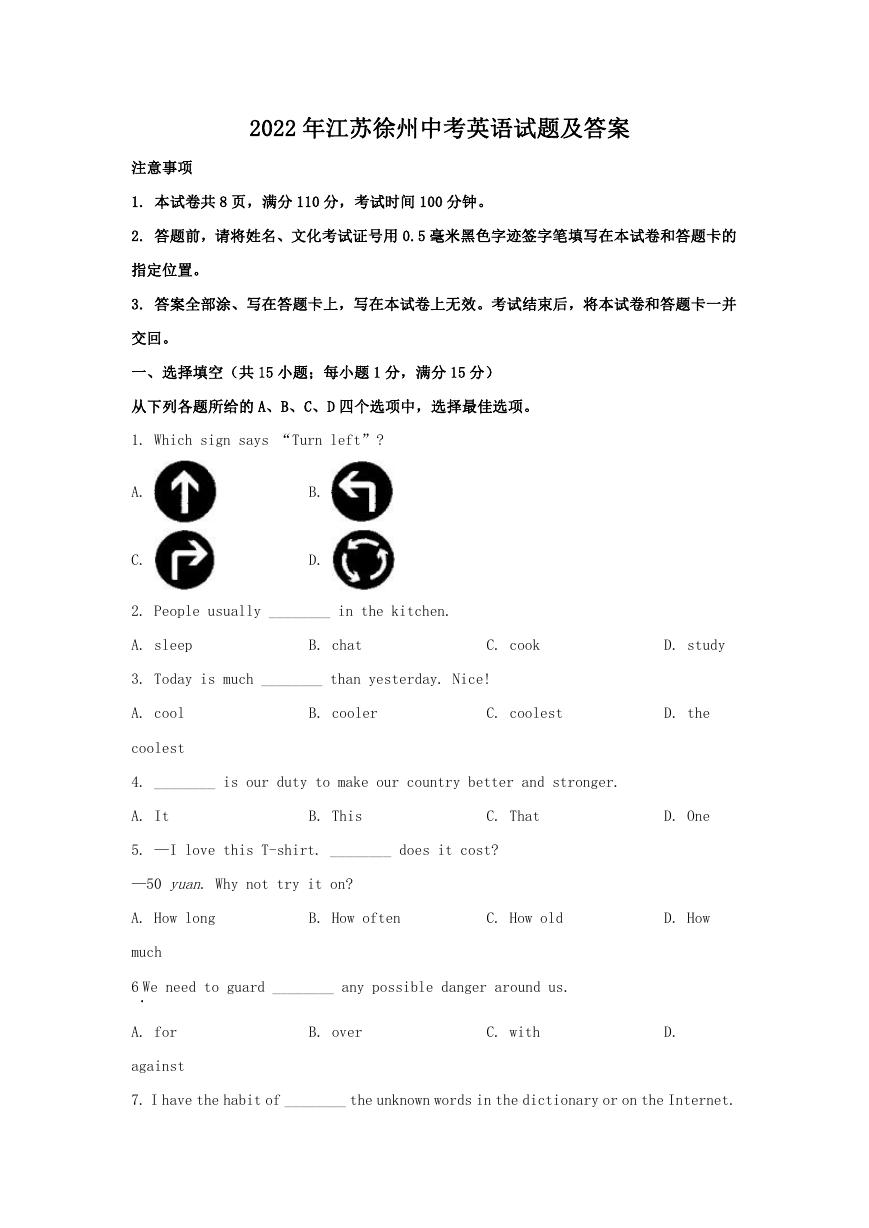
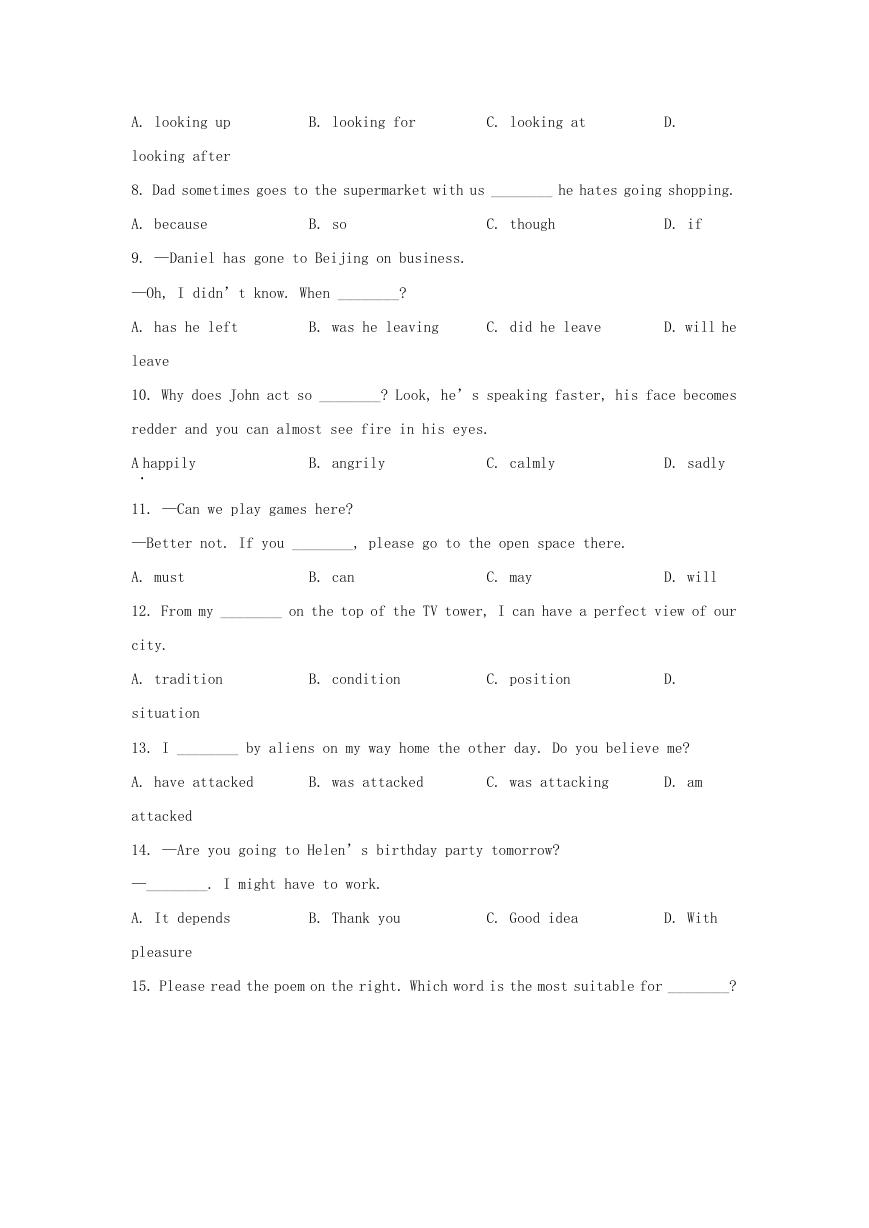
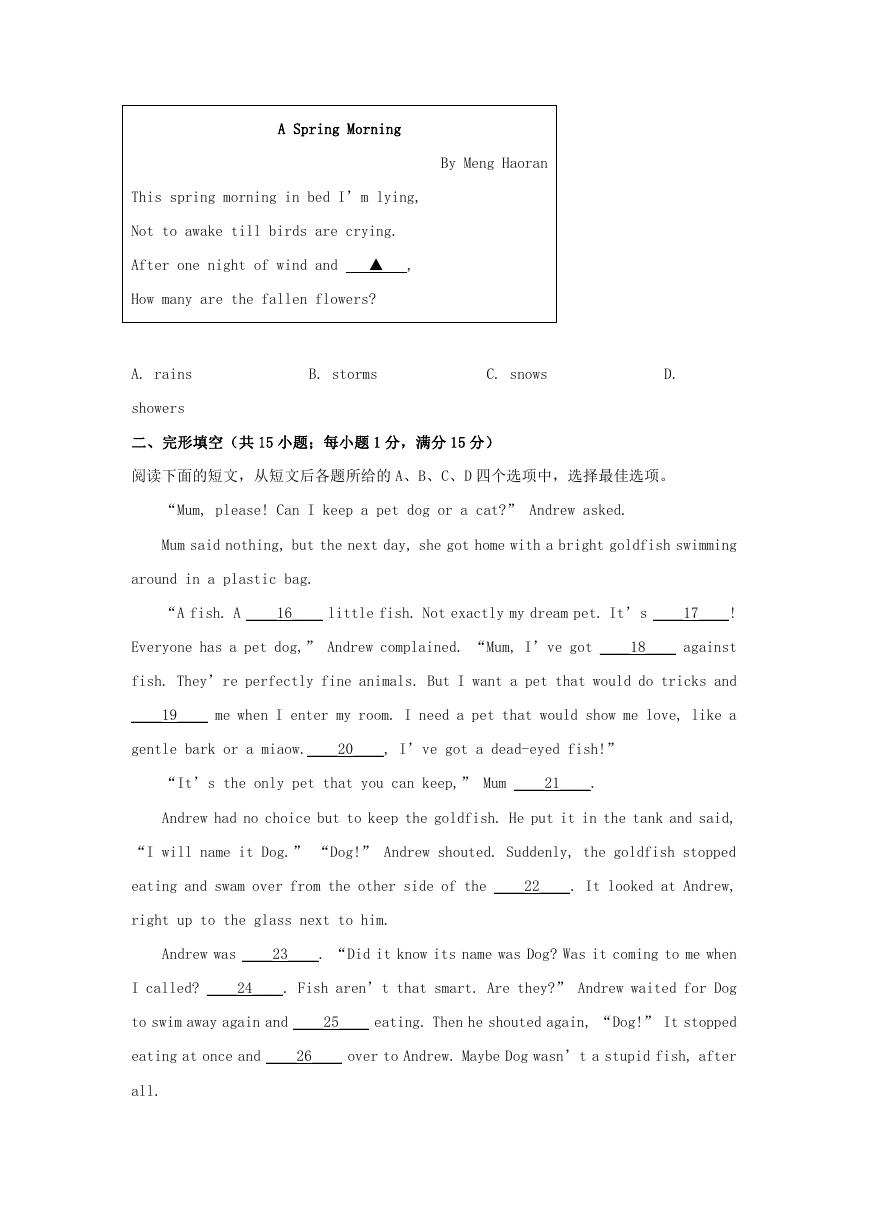
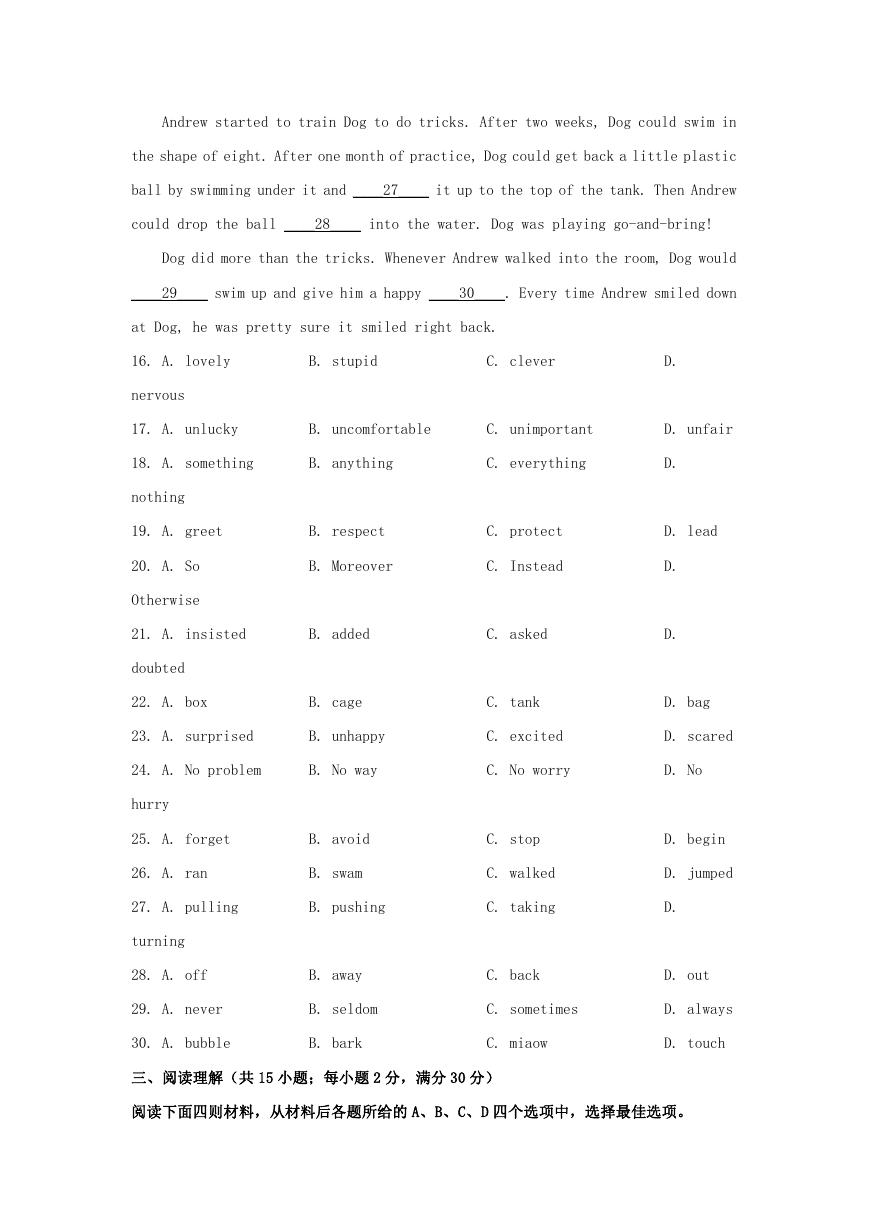
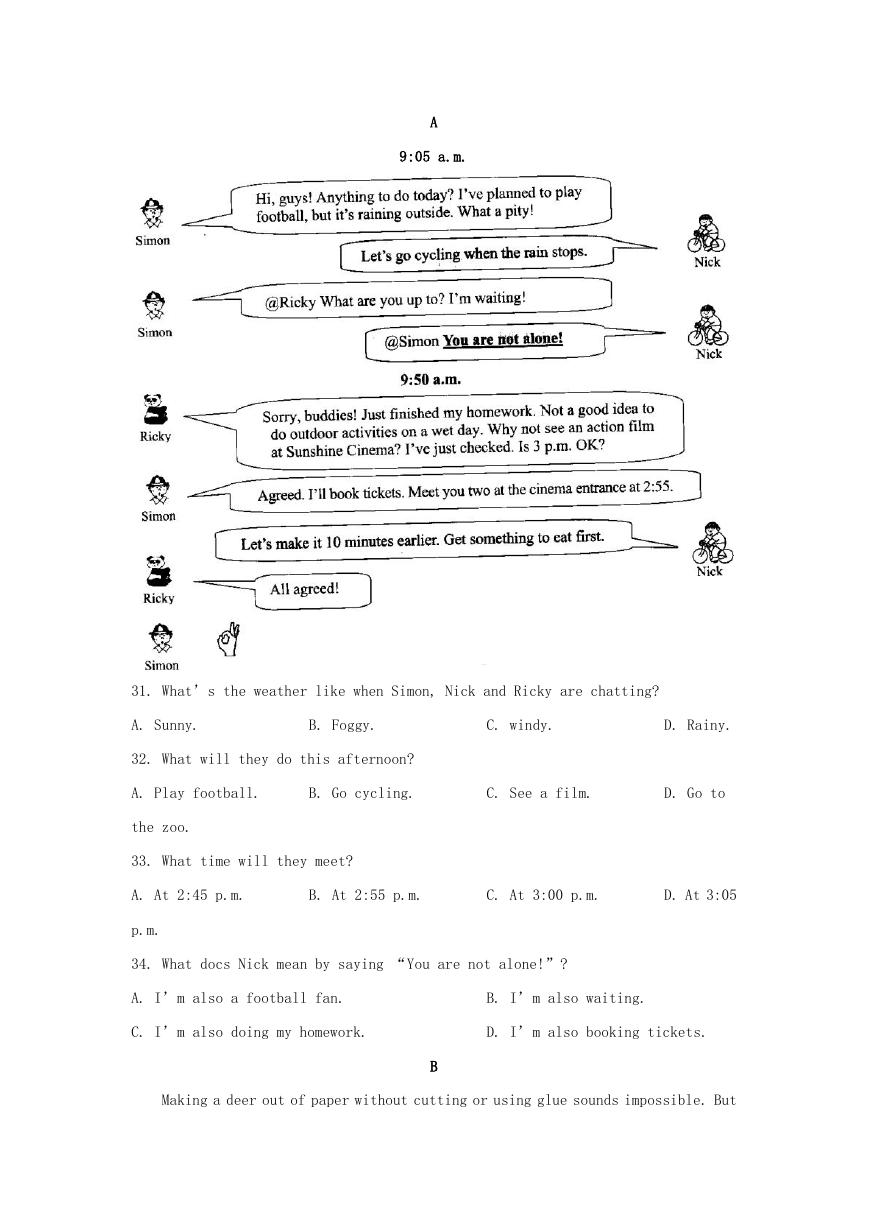
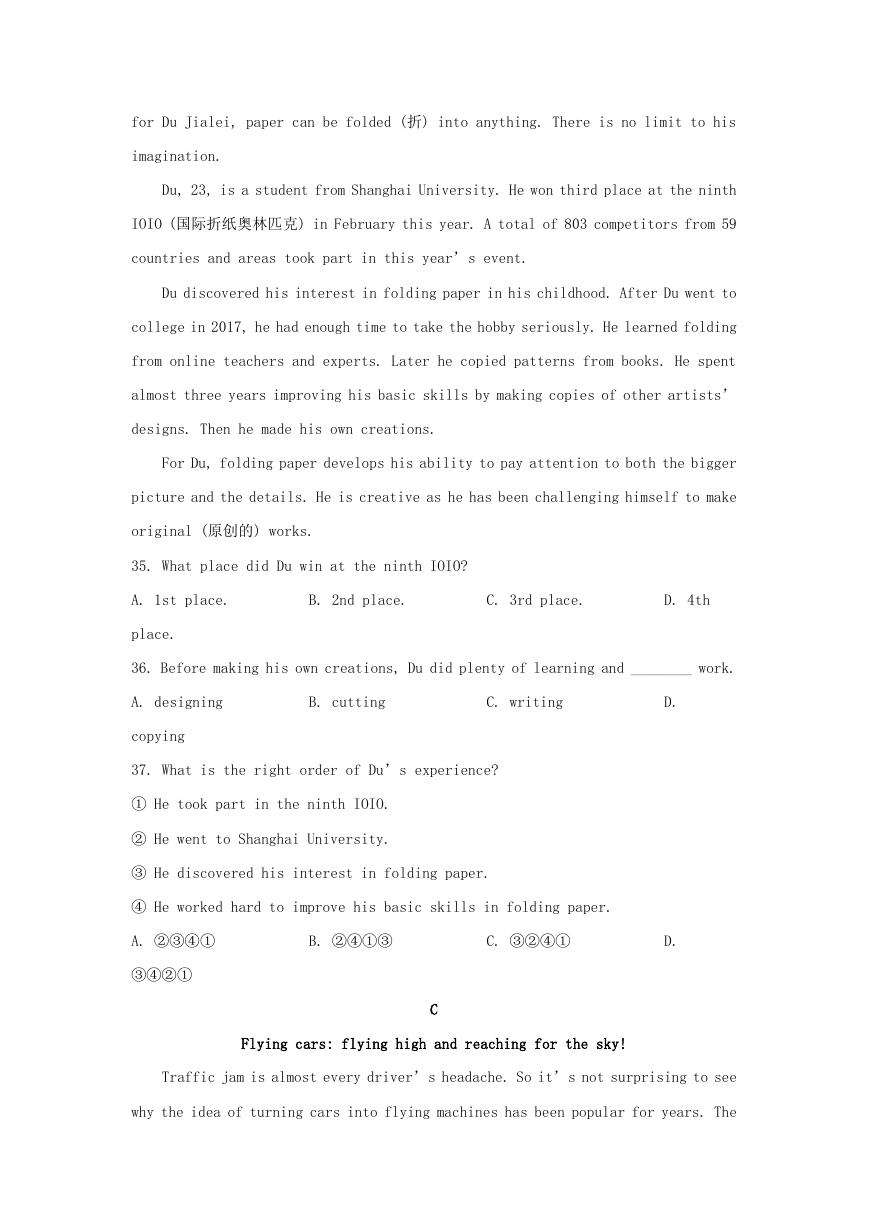
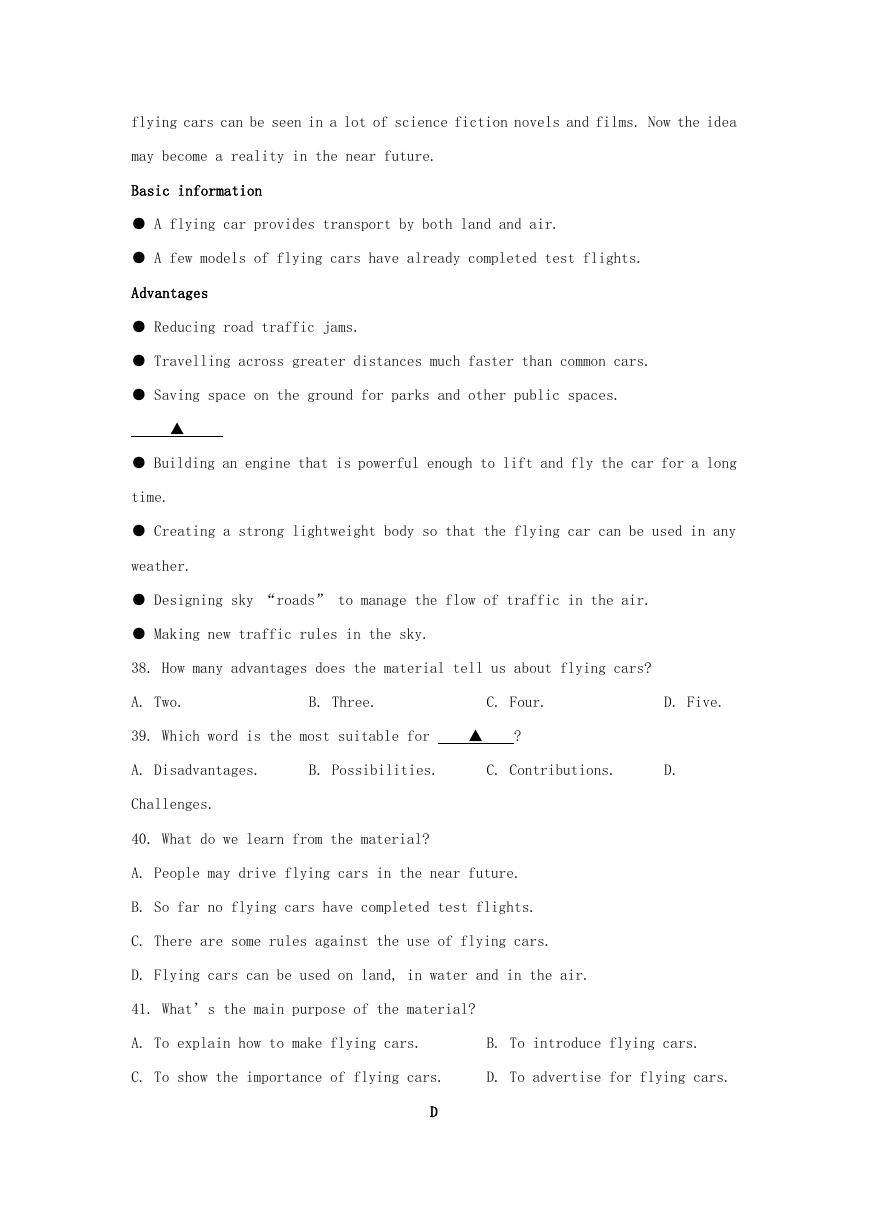
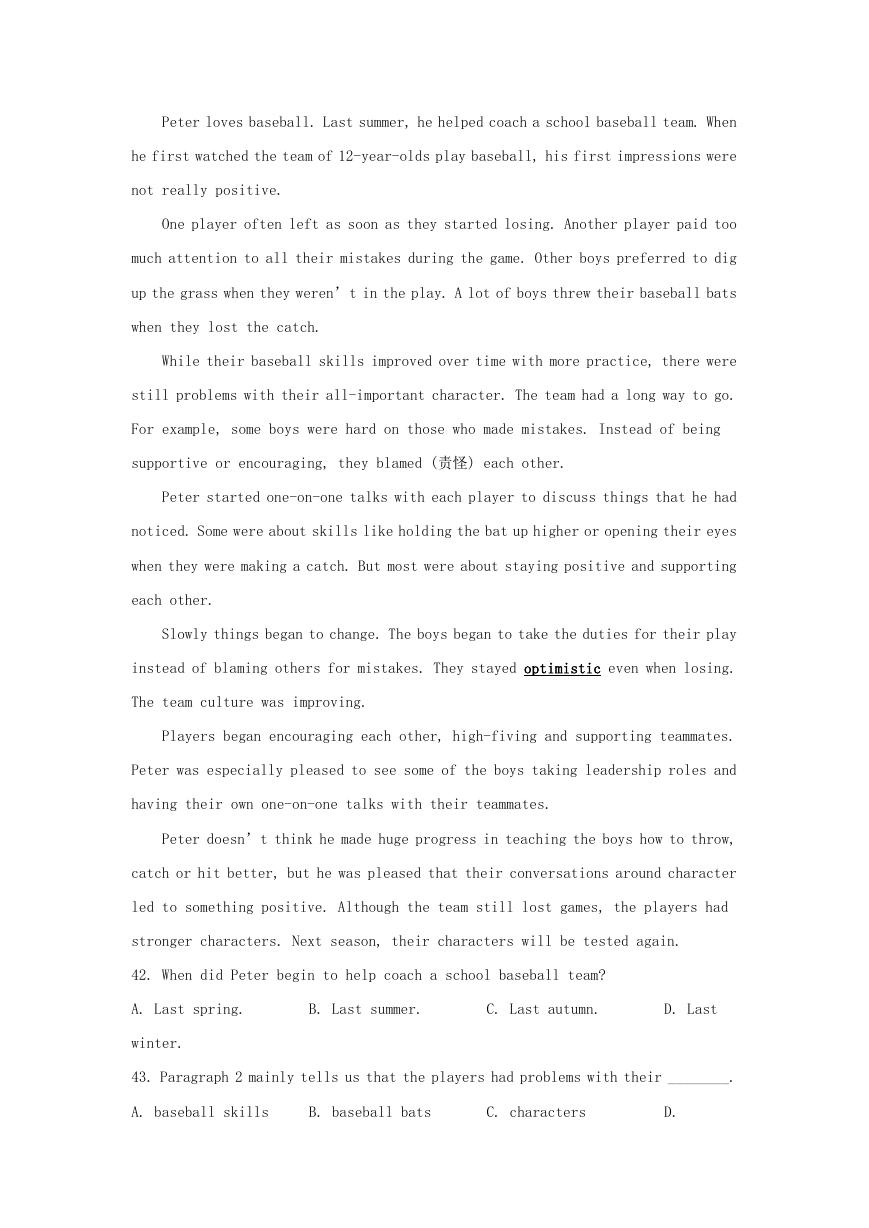








 2023年江西萍乡中考道德与法治真题及答案.doc
2023年江西萍乡中考道德与法治真题及答案.doc 2012年重庆南川中考生物真题及答案.doc
2012年重庆南川中考生物真题及答案.doc 2013年江西师范大学地理学综合及文艺理论基础考研真题.doc
2013年江西师范大学地理学综合及文艺理论基础考研真题.doc 2020年四川甘孜小升初语文真题及答案I卷.doc
2020年四川甘孜小升初语文真题及答案I卷.doc 2020年注册岩土工程师专业基础考试真题及答案.doc
2020年注册岩土工程师专业基础考试真题及答案.doc 2023-2024学年福建省厦门市九年级上学期数学月考试题及答案.doc
2023-2024学年福建省厦门市九年级上学期数学月考试题及答案.doc 2021-2022学年辽宁省沈阳市大东区九年级上学期语文期末试题及答案.doc
2021-2022学年辽宁省沈阳市大东区九年级上学期语文期末试题及答案.doc 2022-2023学年北京东城区初三第一学期物理期末试卷及答案.doc
2022-2023学年北京东城区初三第一学期物理期末试卷及答案.doc 2018上半年江西教师资格初中地理学科知识与教学能力真题及答案.doc
2018上半年江西教师资格初中地理学科知识与教学能力真题及答案.doc 2012年河北国家公务员申论考试真题及答案-省级.doc
2012年河北国家公务员申论考试真题及答案-省级.doc 2020-2021学年江苏省扬州市江都区邵樊片九年级上学期数学第一次质量检测试题及答案.doc
2020-2021学年江苏省扬州市江都区邵樊片九年级上学期数学第一次质量检测试题及答案.doc 2022下半年黑龙江教师资格证中学综合素质真题及答案.doc
2022下半年黑龙江教师资格证中学综合素质真题及答案.doc